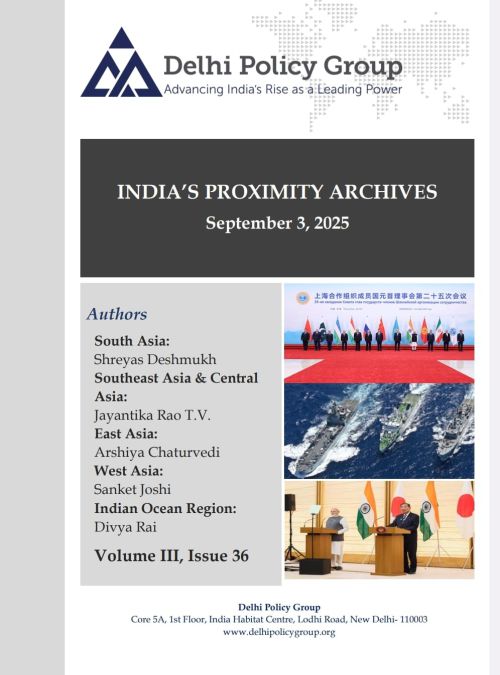India’s Proximity Archives
South Asia
Unrest persists in numerous universities in Bangladesh following recent conflict between student factions and escalating campus tension. On August 31, violent confrontation broke out between students and local residents near Chittagong University and its vicinity, leading to injuries of over 300 teachers, students, police officers, and journalists. On August 29, clashes occurred between activists of the Jatiya Party (JaPa) and Gono Odhikar Parishad in Kakrail. According to the Human Rights report released on August 31, the law and order situation in Bangladesh is deteriorating due to the increasing number of mob violence-related killings. In July, mob attacks resulted in 16 fatalities, and in August, there were 23 fatalities and 43 serious injuries from similar occurrences. In addition, another report from August documented that 223 women and girls throughout Bangladesh were subjected to violence, with a majority of cases involving murder and rape.
Southeast Asia
After long uncertainty, on August 29, Thailand's Constitutional Court dismissed Prime Minister Paetongtarn Shinawatra for an ethics violation following her suspension in July after a leaked phone call between her and former Cambodian Prime Minister Hun Sen emerged. Since the announcement, the ruling Pheu Thai party is still governing in a caretaker capacity with Thailand’s acting Prime Minister Phumtham Wechayachai at the helm aiming to negotiate with the largest opposition party, the People’s Party, to secure backing. However, once the People’s Party announced that they would support conservative tycoon Anutin Charnvirakul, Pheu Thai announced that they would dissolve the parliament on September 3.
East Asia
From August 31 to September 1, China hosted the 25th Meeting of the Council of Heads of State of the Shanghai Cooperation Organisation Plus (SCO+) in Tianjin. The meeting was attended by leaders of the 10 SCO member states, representatives from observer states, dialogue partners, and guest countries, as well as heads of international organisations, including UN Secretary-General António Guterres. China’s President, in his address, noted that the world of today is in a new period of turbulence and transformation, with global governance at a crossroads. He urged attending countries to work towards upholding the principle of peaceful coexistence and strengthening confidence in win-win cooperation. Mr. Xi also reaffirmed China’s commitment to building a more just and equitable global governance system and advancing a community with a shared future for humanity, and proposed the Global Governance Initiative (GGI). The initiative, as he asserts, will focus on key principles, such as ensuring equal sovereignty for all countries regardless of size, strength, or wealth in decision-making and benefits; adhering to international law; practising multilateralism; adopting a people-centred approach; and prioritising real, coordinated actions to achieve tangible outcomes.
West Asia
On August 29, the US Department of State announced that it would “deny and revoke visas” of members of the Palestinian Authority (PA) and Palestine Liberation Organisation (PLO). This is likely to impact Palestinian President Mahmoud Abbas' attendance at the UN General Assembly Session to be held in New York in September 2025. The US called upon the Palestinian Authority and the PLO to reject terrorism and stop pursuing unilateral recognition of a “hypothetical state”. Palestinian Authority expressed "astonishment" at the US’ decision and urged Washington to reinstate President Abbas's visa before the UNGA, where Western countries such as France, Canada, Belgium, the UK, and Australia are scheduled to formally recognise a Palestinian state.
Central Asia
On August 28, Kazakhstan and Tajikistan signed the Treaty on Friendship, Good-Neighbourliness and Cooperation for the Development of Central Asia in the 21st Century during Kazakh Deputy Prime Minister and Foreign Minister Murat Nurtleu’s visit to Dushanbe. According to the Kazakh Foreign Ministry’s press service, the implementation of the treaty’s provisions will provide a powerful impetus for strengthening mutually beneficial and comprehensive regional partnerships.
Indian Ocean Region
On September 1, 2025, the ships of the Indian Navy’s First Training Squadron (1TS) — INS Tir, INS Shardul, and CGS Sarathi — arrived at Port Victoria, Seychelles, as part of their long-range training deployment in the Southwest Indian Ocean Region. During the port call, the senior officer will engage with key dignitaries from the Government of Seychelles, senior officers of the SDF, and officials from the Indian High Commission. The visit includes professional exchanges, cross-deck visits, and training interaction between the two navies. This deployment marks the third visit of Indian Navy ships to Seychelles in 2025, underlining the growing bilateral maritime engagement. It is closely aligned with India’s broader MAHASAGAR vision for fostering security and cooperation across the Indian Ocean Region (IOR).



